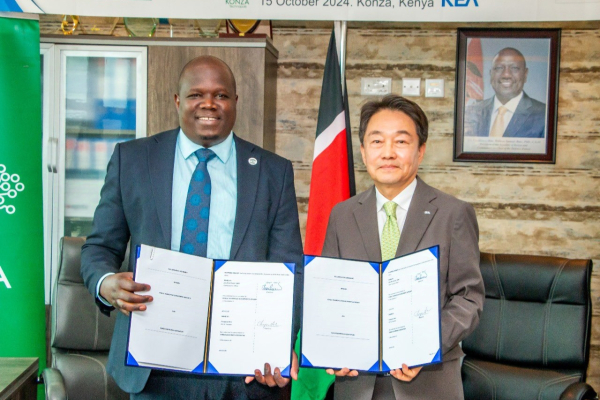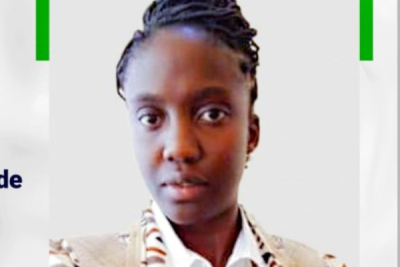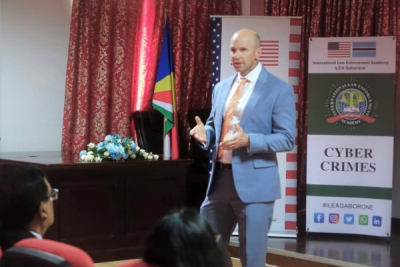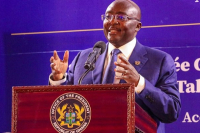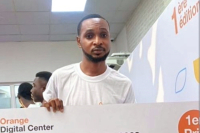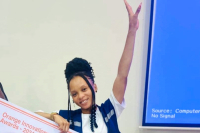Partnerships with advanced technology nations can accelerate Africa’s digital transformation by bringing in expertise, infrastructure, and cutting-edge technology. This helps build local capacity, allowing African nations to become more self-reliant and competitive globally in fields like tech manufacturing and innovation.
Kenya signed a Memorandum of Understanding (MoU) on October 15 with the Korea Electronic Association (KEA) to establish a $1.4 million tech manufacturing support center at Konza Technopolis. This initiative aims to accelerate local tech production and further establish Kenya as a technology hub in Africa. The center will support product launches, workforce training, and local production of high-tech products from leading Korean companies.
John Paul Okwiri, CEO of Konza Technopolis, emphasized the center’s potential to advance the region’s tech landscape, citing it as a “testament to our take off as we expect substantial investment by korea companies in the electronics and IT ecosystem.”
The center’s construction, expected to take two to three years, will be managed by KEA, which represents over 370 major Korean tech firms, including Samsung and LG Electronics. The project will unfold in four stages: initial planning, electronics manufacturing training, equipment installation, and operational expansion with enterprise support.
In its ECONOMIC SURVEY 2024, the Kenya National Bureau of Statistics revealed that the Information and Communication sector contributed 9.3% to GDP in 2023. To diversify the economy, the government aims to see this sector take on greater economic value. It has been undertaking policy reforms and major infrastructure projects to this end for several years to attract investors. This Tech Manufacturing Hub is one of the manifestations of this ambition.
The center is set to support the annual launch of 30 tech products, reducing average production time to six months. It also aims to train approximately 100 individuals while supporting over 100 local businesses. This collaboration reflects Kenya’s strategy to harness technology for economic growth, create jobs, and enhance its role in Africa’s digital economy.
Hikmatu Bilali
He aims to bridge the gap between academic training and the needs of the professional world. He supports young IT students while providing businesses with digital solutions.
Roussel Célestin Andriamitasoa is a Malagasy IT specialist and tech entrepreneur. He is the co-founder and CEO of Kante Company, a digital agency and platform dedicated to the professional integration of IT students.
Founded in 2022, Kante Company specializes in web and mobile application development, IT education, design, data science, and artificial intelligence (AI) engineering. The company provides young graduates with their first professional experience, enhancing their skills and helping them integrate into the job market, thus bridging the gap between academic training and employment in the tech sector.
“After their training with us, we collaborate with several digital services companies (ESNs) and both local and international firms to place these students in companies once they graduate. With over two years of experience gained through our platform, they are able to start successful careers,” explains the company, which won first place in the Orange Social Venture Prize Africa & Middle East (POESAM) 2024 for Madagascar.
Roussel Célestin Andriamitasoa graduated from IT University, an online learning provider, with a bachelor’s degree in computer science in 2023. Between 2021 and 2022, he worked as a client advisor at Intelcia, a business consulting firm. From 2023 to 2024, he was a developer at Lifetime Travel, a Malagasy company.
Melchior Koba
She is an expert in artificial intelligence, energy management systems, as well as smart grids and meters. She leverages technology to revolutionize how Cameroonians use electricity.
Agnès Virginie Tjahe (photo) is a Cameroonian tech entrepreneur and the founder of EMKit, a project aimed at addressing various issues related to electricity consumption, including overbilling, underbilling, excessive use, and energy fraud.
Launched in 2019, EMKit offers a system that allows users to monitor and manage their electricity supply and consumption remotely via SMS and the Internet. The kit collects consumption data every hour, which can be used to develop big data solutions for the energy sector. The project also aims to integrate artificial intelligence to enhance decision-making in the field.
EMKit optimizes energy use in Africa by helping reduce high electricity bills for households and combating fraud and underbilling on the power grid. The solution promotes energy efficiency, supports the development of smart grids, and drives the growth of big data in the energy sector.
The startup has already developed three different prototypes and installed ten kits in households in the western region of Cameroon. In August 2024, Agnès Virginie Tjahe won the women’s prize and first place on the Orange Social Venture Prize Africa & Middle East (POESAM) national stage in Cameroon.
In addition to her entrepreneurial work, Agnès Virginie Tjahe is a lecturer in the Department of Mechanical and Production Engineering at the Fotso Victor University Institute of Technology, part of the University of Dschang in Cameroon.
She holds a master’s degree in mechanical engineering obtained in 2014 from the National Advanced School of Agro-Industrial Sciences (ENSAI) at the University of Ngaoundéré, and a PhD in energy mechanics from the University of Dschang, earned in 2019.
Melchior Koba
As the world becomes increasingly digital, it's essential for the judicial system to effectively manage cases involving digital evidence. In Africa, initiatives are underway to adapt to these new realities.
The Seychelles judicial system announced on Tuesday, October 15, a two-day training session at the Palais de Justice in Port Island. Conducted in partnership with the International Law Enforcement Academy (ILEA) and the U.S. Secret Service, the initiative aimed to strengthen the skills of Seychellois judges and legal professionals in handling and authenticating digital evidence.
According to a statement from the judicial system, the training emphasized the need to understand how digital information flows, the importance of protecting people's privacy online, and the difficulties of using digital evidence in court cases, especially when the crimes happen across different countries. Topics covered included the evolution of laws in response to digital advancements, the balance between privacy protection and security requirements, and the authentication of digital evidence. Judges were trained to distinguish between legitimate evidence and potentially falsified information, using examples from social media platforms like Facebook and manipulated images.
This initiative comes amid a global trend where the use of digital data is becoming increasingly vital for the administration of justice. The digital era and the emergence of new technologies, such as AI, demand that judicial systems modernize. A survey by Cellebrite, an Israeli cybersecurity firm, revealed that 60% of over 2,000 investigators, prosecutors, managers, and digital forensics experts surveyed believe digital evidence is more critical than DNA. Additionally, 74% of respondents stated that digital data increases the success rate in resolving cases, underscoring the crucial need for specialized training in this area.
As a result, judges in the Seychelles are now better equipped to tackle challenges associated with managing digital evidence. This initiative not only enhances the judiciary's ability to address current challenges but also reinforces its commitment to transparency, security, and fairness in the age of digital transformation.
Samira Njoya
The Congolese government has made digital technology a cornerstone of its socioeconomic development. To achieve its goals, the administration must ensure the security of the national cyberspace.
On Tuesday, October 15, the Congolese Ministry of Posts, Telecommunications, and Digital Economy launched a cybersecurity training seminar for judicial and law enforcement bodies. The initiative, supported by the United Nations Economic Commission for Africa (ECA) and the African Center for Artificial Intelligence Research (CARIA), will run until October 17.
“This training will enable our security and judiciary institutions to develop essential skills for combating cybercrime, including identifying cyberattacks, collecting digital evidence, analyzing data, tracking cybercriminals, and issuing sanctions,” stated Juste Désiré Mondelé, the Deputy Minister to the Minister of the Interior in charge of Decentralization and Local Development.
This initiative reflects the Congolese government’s commitment to anticipating threats amid the rise of cybercrime across Africa. According to the African Cybersecurity Market, the number of cyberattacks on the continent increased by 23% in the first half of 2023 compared to the same period in 2022. Strengthening the capabilities of judicial and law enforcement bodies is therefore “essential for improving operational competencies in this constantly evolving field.”
The 2024 edition of the Global Cybersecurity Index by the International Telecommunication Union (ITU) places Congo in the category of countries that have done the minimum in terms of cybersecurity, with a score of 27.61 out of 100. The country’s relative strengths lie in regulatory measures (14.12/20) and cooperation (8.87/20). However, it needs to make significant improvements, particularly in technical and organizational measures and capacity development. For the latter, the country scored 0 out of 20.
This training aims to ensure a safer cyberspace as the Congolese government positions digital technology as a cornerstone of its socio-economic development in the years to come.
Isaac K. Kassouwi
Investors' continued interest in Nigeria's tech sectors suggests strong underlying fundamentals and growth potential. A thriving startup ecosystem can provide much-needed employment and stimulate economic growth.
The United Arab Emirates is keen to collaborate with Nigeria to support the growth of its rapidly expanding tech startup ecosystem. Khalfan Belhoul, CEO of the Dubai Future Foundation, made this commitment at GITEX Global, the world’s largest startup and investor event, currently taking place in Dubai from October 14-18.
Belhoul highlighted the importance of partnerships in boosting Nigeria’s digital economy, stating, “We are very much open to collaborations in terms of technology development.” He also acknowledged Nigeria's emerging status in Africa's tech landscape, with a dynamic startup scene that has drawn significant investment, particularly in areas like fintech, healthtech, and agritech.
This partnership will foster an innovation-friendly environment, offer funding opportunities, and encourage knowledge exchange between tech professionals from the UAE and Nigeria.
Nigeria is well-positioned to seize these opportunities, as it has consistently attracted significant investor interest in key sectors. According to PwC's 2023 report, “Growing the Nigerian Technology Ecosystem through the Capital Market,” Nigeria received half of the total funding that went to Africa's "Big Four" tech markets between 2015 and 2022, a period in which these four markets accounted for 73% of all funding in Africa. This underscores Nigeria's potential as a leading tech hub on the continent and highlights the critical role of strategic investments in driving sustainable economic growth.
Hikmatu Bilali
To achieve universal health coverage for its population, Ghanaian authorities are relying on various technological solutions. They have opted for a public-private partnership to reach their goal.
Ghanaian authorities are set to launch, today Octyober 16, the electronic health management system, known as E-Health, which will create digital patient records accessible across all hospitals in the country.
The implementation of this system is a public-private partnership between Ghana’s Ministry of Health and Lightwave e-Health Solutions, a U.S.-based company specializing in e-health.
“Going forward, medical records and the history of patients can be gathered under a single database, which can be accessed by any networked hospital when the patient visits. This digitization effort has increased efficiency, effectiveness, and productivity in service delivery in our health facilities,” stated Ghana’s Vice President, Mahamudu Bawumia (photo).
This launch comes just months after the introduction of drone delivery solutions for medical supplies and online medicine purchasing from pharmacies. It aligns with the 2023-2027 Digital Health Policy and Strategy document, which aims to provide all communities in Ghana with timely, quality, and comprehensive healthcare through the use of information and communication technologies.
According to the Ministry of Health, the new system is expected to generate annual savings of between €50,000 ($54,000) and €300,000. It should also improve patient wait times by 35% to 40% in health centers and district hospitals, while regional and university hospitals could see a more than 40% reduction in wait times.
Adoni Conrad Quenum
He aims to help farmers improve crop management and yields. For his agriculture-focused technological solution, he was awarded by the telecom operator Orange in the DRC.
Lucien Disu (photo) is a DRC-born entrepreneur. He is the co-founder of Best Bilanga Optimal (BBOPT), an innovative tech solution powered by artificial intelligence (AI) aimed at optimizing agriculture in Africa.
BBOPT's mission is to improve crop quality and agricultural yields. The device, designed as a connected object, analyzes soil quality, recommends suitable crops, detects plant diseases using AI, and provides personalized advice through a web and mobile application.
With BBOPT, farmers can monitor their fields remotely and communicate with other growers through a discussion space integrated into the app. The device is equipped with sensors that collect soil data, an automatic irrigation system, and a mechanism that emits sound waves to repel rodents and pests. It is also rechargeable, making it a practical and sustainable tool.
“The goal of my project is to ensure food self-sufficiency with an artificial agronomist that analyzes soil fertility, provides personalized advice through our web and mobile app, and predicts crop yields,” said the entrepreneur, who won second place in the national phase of the Orange Social Venture Prize for Africa and the Middle East (POESAM) in the DRC in September 2024.
Lucien Disu holds a degree in Network and IT Maintenance Techniques, obtained in 2017 from the Chaminade Higher Institute of Computer Science in the DRC. Between 2021 and 2022, he served as Marketing Director at Mastagate, a group of companies specializing in digital technologies.
Melchior Koba
Specifically designed for children with mental issues, it allows 24/7 support with tools like mood journals.
Auzy Mental Health is a Tunisian e-health solution developed by a startup founded in 2021 by Abid Khouloud. The platform allows parents to diagnose and treat their children suffering from psychological, neurodevelopmental, and behavioral disorders.
To achieve this, the healthtech company offers personalized monitoring, online diagnostics, and 24/7 support, guiding parents from pregnancy and integrating tools such as a mood journal, progress tracking, and therapeutic exercises.
Unlike many solutions, Auzy Mental Health does not have a mobile app. Users access the platform directly through a web browser via its website. While users can create an account by providing personal information, this step is not necessary for browsing the platform.
The Tunisian startup also provides information on various conditions it addresses, including hyperactivity, intellectual disability, autism, and dyslexia. It offers online tests supported by artificial intelligence to assess children's health and provides advice for parents on managing these conditions or recognizing potential signs.
The process involves becoming informed, undergoing testing, and selecting a healthcare professional to support the child. “Our primary goal is to ensure that every child has the right to become an active member of society and access all decent means of living. We work to provide guidance, coordination, and an early intervention process for children with neurological developmental disorders,” explains the startup.
In September 2024, Auzy Mental Health was selected to represent Tunisia in the final phase of the Orange Social Entrepreneur Prize for Africa and the Middle East in the International Women’s Award category.
Adoni Conrad Quenum
She aims to bridge the educational and digital divide in disadvantaged communities. Her innovation in the field of education has earned her an award from the French telecom group Orange.
Monica Jackson (photo) is a physics student at the University of Sierra Leone and the co-founder and CEO of Educube, an innovative educational technology company. Established in 2024, Educube transforms shipping containers into self-sustaining digital learning centers powered by solar energy, specifically targeting underserved communities. The company provides accessible, high-quality educational resources, internet connectivity, and digital literacy programs.
“Our primary focus is on students from rural communities where many children have never encountered a computer. In villages lacking a digital center, how can we ensure they have access? How can we guarantee that every school in these areas has a digital center within the next three years? The good news is here: Educube,” Jackson explains.
Educube empowers learners of all ages—whether they are students or farmers—by equipping them with the skills necessary to thrive in an increasingly digital world. Beyond digital literacy, the company advocates for climate-resilient agricultural practices, supporting sustainable development and food security while helping communities adapt and thrive.
In recognition of her work with Educube, Monica Jackson received the Orange Social Venture Prize 2024 in Sierra Leone, where she was honored as Tech Queen for her innovative solutions.
Melchior Koba
More...
In today's digital world, data management is a top priority for governments and businesses alike. Implementing solutions like artificial intelligence is crucial to tackling the challenges of information security and confidentiality.
Morocco will accelerate its digital transformation by leveraging the expertise of AI71, a company specializing in artificial intelligence (AI). On Monday, October 14, a partnership agreement was signed in Dubai during the Gitex Global technology exhibition between Morocco's Ministry of Digital Transition and the United Arab Emirates' Technology Research Council, which owns AI71.
Under the agreement, Morocco will leverage AI-based solutions developed by AI71. In addition to integrating these advanced technologies, the initiative aims to support Moroccan startups by providing them with privileged access to innovative solutions through partnerships with the Emirati company. The goal is to boost these young companies' competitiveness on the international stage.
This partnership is part of the "Morocco Digital 2030" strategy and strengthens the country's digital transformation efforts. It particularly focuses on adopting AI solutions like "Falcon," which will provide Moroccan businesses and institutions with effective tools for data management and protection. These solutions will enhance information confidentiality and security, addressing the current challenges of handling personal data.
The management of sensitive data is a critical issue for Moroccan startups. AI, particularly through AI71's models, could offer automated solutions to secure data, increase transparency, and ensure compliance with international standards while fostering digital innovation and growth for startups. According to a study by PwC, AI adoption could generate up to $1.2 trillion in Africa by 2030, representing a 5.6% increase in the continent's GDP.
Samira Njoya
With technological advancements, there are increasingly sophisticated regulatory challenges around data privacy, cybersecurity, and online safety. Establishing a unified regulatory platform supports broader goals, like increasing internet penetration and digital literacy, which are vital for economic development in the digital age.
On October 10, South Africa launched the ICT and Media Regulators Forum (ICTMRF) to unify regulatory efforts in ICT and media. The initiative, under the theme “United for a better digital world" will enhance regulatory cooperation, reduce redundancies, and address challenges posed by the rapidly evolving digital landscape.
ICASA CEO Tshiamo Maluleka-Disemelo, chair of the forum, highlighted that the goal of the partnership is “to work together to solve shared challenges and seize new opportunities,” while emphasizing the forum’s potential to create a more responsive regulatory framework.
The forum includes the Independent Communications Authority of South Africa (ICASA), the Information Regulator, the .ZA Domain Name Authority (ZADNA), and the Film and Publication Board (FPB). It will focus on data privacy, cybersecurity, and online safety, among other priorities, and aims to foster synergy among participating entities to address issues like child safety online and harmful content.
The move addresses long-standing concerns about fragmented ICT regulation in South Africa. The ICT market in South Africa is expected to grow at a steady rate, driven by the adoption of digital services and technology integration across industries. Mordor Intelligence projects the market to grow from an estimated USD 36.81 billion in 2024 to USD 53.85 billion by 2029, with an expected compound annual growth rate (CAGR) of 7.9% over the forecast period.
Addressing regulatory fragmentation through platforms like the newly established ICT and Media Regulators Forum could enhance coherence and make South Africa’s regulatory framework more agile and efficient. This is crucial for maintaining global competitiveness and attracting investments in digital infrastructure.
Hikmatu Bilali
Last March, the American company Pay Rem Group Africa announced several digital projects in Congo. It partnered with a key government ministry.
The Congolese government and Pay Rem Group Africa, a U.S. company specializing in modernizing financial services, signed, on October 11, a memorandum of understanding to support digital and technological projects in the country.
Jacqueline Lydia Mikolo, Minister of Small and Medium Enterprises (SMEs) and Handicrafts, announced the partnership, stating that Pay Rem Group Africa would provide training, design digital and technological solutions, and help secure funding for these initiatives.
This agreement follows similar partnerships with the Digital Economy Development Agency (ADEN) and the Congolese Postal and Savings Company (Sopeco) aimed at promoting digital inclusion and bridging the digital divide. It is part of the "Congo Digital 2025" strategy, which seeks to ensure equitable access to digital services for all citizens.
The partnership could enhance the integration of digital technologies into SMEs, modernize the Congolese economy, and create jobs in the tech sector. It may also provide entrepreneurs with better training opportunities and access to financing solutions to support digital projects.
Adoni Conrad Quenum
The government is committed to transforming Djibouti into a digital powerhouse by 2035. Recognizing that young people are essential to this transition, they are investing heavily in developing technological skills among the youth population.
Djibouti is set to launch a new coding and IT school, the Djibouti Code Campus (DCC), aimed at equipping young people with the skills needed for the digital age. The official signing of the school's statutes took place on Sunday, October 13, under the patronage of Mariam Hamadou Ali, Minister of Digital Economy and Innovation.
In her speech, Minister Ali highlighted the importance of this initiative for Djibouti's future development. "A nation's progress is primarily driven by its human capital. By training experts in cutting-edge technologies, we are empowering our youth to actively contribute to Djibouti's prosperity and modernization," she said.
The DCC aligns with the government's "Smart Nation" strategy, which seeks to transform Djibouti into a digital hub in East Africa. Inspired by the renowned Ecole 42 programming school, the DCC will employ an innovative approach focused on project-based learning, autonomy, and collaboration. This method has proven successful in major cities worldwide, with job placement rates exceeding 90%.
Supported by the private sector and international partners, the DCC will offer free, accessible training in high-demand skills like coding and artificial intelligence. This initiative aims to bridge the digital divide, improve youth employability, and encourage entrepreneurship. By investing in this innovative educational model, Djibouti is positioning its youth to play a key role in the global digital economy and fostering the country's modernization and economic growth.
Djibouti is targeting digital emergence by 2035. According to the "Measuring Digital Development – ICT Development Index 2024" published by the International Telecommunication Union (ITU), Djibouti scored 61.6 out of 100 on ICT development in 2024. This ranking placed Djibouti 17th in Africa out of 45 countries, with Libya leading the continent at 88.1 points. Djibouti's score was above the regional average, demonstrating its efforts to strengthen its digital sector.
Samira Njoya


